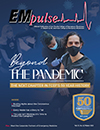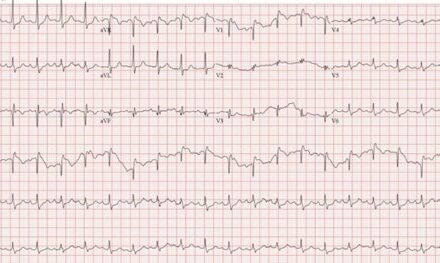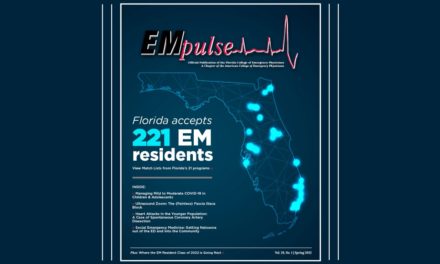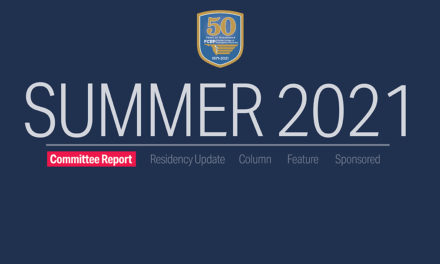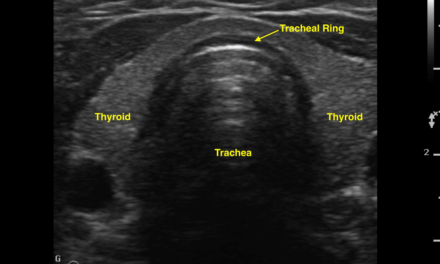Finding Joy in Work: A Story of Resilience and Wellness
After the pandemic began, a friend of mine who manages student learners said to me, “no one is happy right now.” Most of us in emergency medicine just experienced one of our toughest years. We have all been dealt many hardships by living “a new normal,” which is hardly normal, amid a pandemic. Many days were dark and difficult, to say the least. Our personal lives have been affected. Our work lives have been dramatically altered. We have experienced cancelled vacations, changes in pay, more or fewer shifts, quarantines for ourselves or our family members, wearing PPE at all times on shift, and all while still trying to reach our career goals.
I will remind us all of a simple word: grace. Grace, by definition, refers to a smooth and pleasing way of moving, or a polite and thoughtful way of behaving. This year, we all need to offer ourselves grace. We have all struggled. And it hasn’t just affected us; we need to offer grace to our partners, friends, families and patients, too. When I see others acting out or being unkind, I think, “wow, they sure need more grace. They must really be struggling, too.” Another component I have found necessary is gratitude. Gratitude is a way for us to put it all back together. I call it G and G: Grace and Gratitude. I often find that when I reflect on what I’m most grateful for, I feel more fulfilled with my family and my career.
As this unprecedented year comes to a close, I find it helpful to review the 5 Rs: review, reflect, refine, results and remind. These 5 R’s were adopted by Elizabeth Benton, the author of Primal Potential, of which I am an avid podcast listener.
Review. Make sure you review your major accomplishments and celebrate the victories, no matter how small. Some days, these accomplishments may just be getting up, getting dressed, getting to work, and having a shower at the end of it all. Write them down.
Reflect. Reflect on how you are feeling. How did you show up? What did you love, and what did you not love? What do you want to change? How are you going to make those adjustments in the year ahead?
Refine. Refine your answers. What can you shift? How can you make it possible? Where will you budget your commitments? 2020 has helped many of us identify and clarify our top priorities.
Results. What results do you want to create for yourself? When you sit here next year, what do you want to be possible?
Remind. Remind yourself regularly and create a list. Write it down and place it somewhere you can see it.
But I ask that we add one more R: Resilience. What have you done to remain resilient this year? When I think of resilience I think of Tigger from Winnie the Pooh. Resilience is our ability to bounce back. What has helped you bounce back? How well did you do it? What has kept you “bouncing on” amidst the many tragedies and challenges that we have encountered this year?
My reflection of resilience will include G and G. Gratitude and grace are key partners within resilience. We need to offer ourselves grace and gratitude to remain resilient and to prevent burnout.
Burnout was a problem before Covid-19. But what is it exactly? Burnout is defined as “the progressive loss of idealism, energy and purpose experienced by people in the helping professions as a result of the conditions of their work.” It is further defined by three key characteristics: 1) physical and emotional exhaustion, 2) cynicism and 3) inefficiency. [1]
Physicians are at risk for burnout due to both work and personal characteristics. Work factors include overload, lack of control over one’s workplace environment, lack of resources, feeling poorly managed, or spending a bulk of time at work on tasks that are inconsistent with one’s career goals. Another factor is high levels of work-home interference. Who this year has not had high levels of work-home interference? The consequences of burnout, compassion fatigue and moral distress are profound, and range from personal crisis to suboptimal patient care practices. Burnout is most often measured through the Maslach Burnout Inventory, which can be measured simply by using questions such as, “do you feel burned out from your work?” [2]
So how can we keep these dangers at bay? How can we combat burnout? For me, it is self-care and reflection.
Personal self-care refers to strategies for individuals to take better care of themselves. It starts with the recognition that people have multiple personal dimensions to attend to in order to live a “good” life, including our life experiences, families, community and spirituality. A widely available instrument called the “wellness wheel” refers to six types of wellness: physical, intellectual, emotional, spiritual, social and occupational. It allows individuals to reflect on their current life balance and self-care. [3]
Yet current evidence indicates that medical students, residents and fellows receive inadequate training in self-care. In the accreditation standards for U.S. and Canadian medical schools, while highlighting the importance of exposure to personal counseling as a resource, the liaison committee on medical education does not specifically identify self-care or other related areas.3 Similarly, review of the literature reveals that there is no published curriculum focused specifically on self-care or any of these specialty areas. This review was performed by the Accreditation Council for Graduate Medical Education (ACGME), which oversees the training of U.S. residents and fellows.5 ACGME has not included self-care or related areas in its outline of competencies for trainees and all specialties, with the exception of education on sleep management.5 So, if most of us don’t know enough about self-care, so what are we teaching our learners?
I remember driving into an ER shift this year, just not wanting to go back to work. The last few shifts were rough with little down time in between, but there were the ambulances and police cars outside of the ambulance bay, waiting for my arrival. I sat in my car, took a deep breath, and had a real moment of reflection. I had to change my mindset. I remembered something that was very important: I had always wanted to be a doctor. It was my dream to take care of the sick and injured. I had to reflect again on some gratitude, because I was living the life I had always wanted. Yes, we have all sacrificed a lot to get here. We have all missed weddings, family vacations, and delayed other opportunities to study hard and achieve this dream. I had to remind myself that I am now a double-boarded physician. I can walk through those doors of the ambulance bay and sit in the attending chair, the throne I have always wanted. This was my dream, and I am now living it! I love being a pediatric emergency medicine physician. After I changed my mindset, I walked through those ambulance bay doors, ready to take on the challenges of the day.
Another way I have really learned to build resilience is to find what sparks joy at work. Maybe that includes writing with a new pen, comfortable scrubs, or your favorite coffee cup. Today, amongst this pandemic, we all need to do “what sparks joy.” A colleague of mine who grows a garden brought in a beautiful sunflower to work. She placed it in a urinal with water and put it next to the attending computer. (I know this group will appreciate that the urinal was the vase.) It was beautiful, and many commented on it. I now call the sunflower my “Covid-19 flower,” because it sparks joy for me. For others, maybe it is not a flower, but whatever it is, you need to find it or do it.
I began to do other things to spark joy at work. I had to reflect on what really made me happy. I went back to memories of my college days. I loved music and I loved to run. I really miss concerts this year. So how did I spark joy? I created my own Covid-19 playlists. I blare them in my car pre- and post-shift. I have my fight songs on the way in, and my comfort songs on the way out. I also run long and hard after the tough shifts. Whatever it is that you do that you love, do it again. Find your hobby that speaks to you and do it. Reading, writing, art, music, crafts or exercise—there is no wrong answer here. Do what sparks joy for you.
As physicians in Covid times, we need to remember to take care of ourselves and give lots of grace, reflect on gratitude, and spark joy wherever we can. We need to appreciate the little things that help us navigate the big things we cannot control. It may take more time, energy, and reminders this year to get through the day, but most of us are still living our dreams. We expend time, energy and tears caring for everyone else. Give grace, spark joy, and in the moments that are quiet and less chaotic, remember to have gratitude. And always remember that hope is ahead of us. We have come down a long road in an exceptionally hard year, but there is finally some hope: the vaccines are finally here. And I hope that 2021 will only bring more hope, resilience and wellbeing for us all. ■
References
- Kearney MK. Weininger RB, Vachon ML, Harrison RL. Mount BM. Self-Care of physicians caring for patients at the end of life. “Being Connected… a key to survival”. JAMA 2009; 301(11): 1155-1164. E1. (Pubmed: 19293416)
- Linzer M, Rosenberg M, McMurray JE, Glassroth J. Respecting the lifecycle: Rational workforce planning for a section of general internal medicine. Am J Med, 2002; 113(5): 443-448. (Pubmed 12401545)
- Wallace JE. Lemaire JB, Ghali WA. Physician Wellness: a missing quality indicator. Lancet, 2009: 374(9702):1714-1721. (Pubmed: 19914516)
- Functions and structure of a medical school: LCME accrediation standards. Liaison Committee on Medical Education. Accessed Dec 2020. http://www.lcme.org/standard.htm. Published May 2012.
- Wald HS, Davis SW, Reis sp, Monroe AD, Borkan JM. Reflecting on reflections: enhancement of medical education curriculum with structured field notes and guided feedback. Acad Med 2009: 84(7): 830-837. Pubmed 19550172.
This article is part of the following sections:


